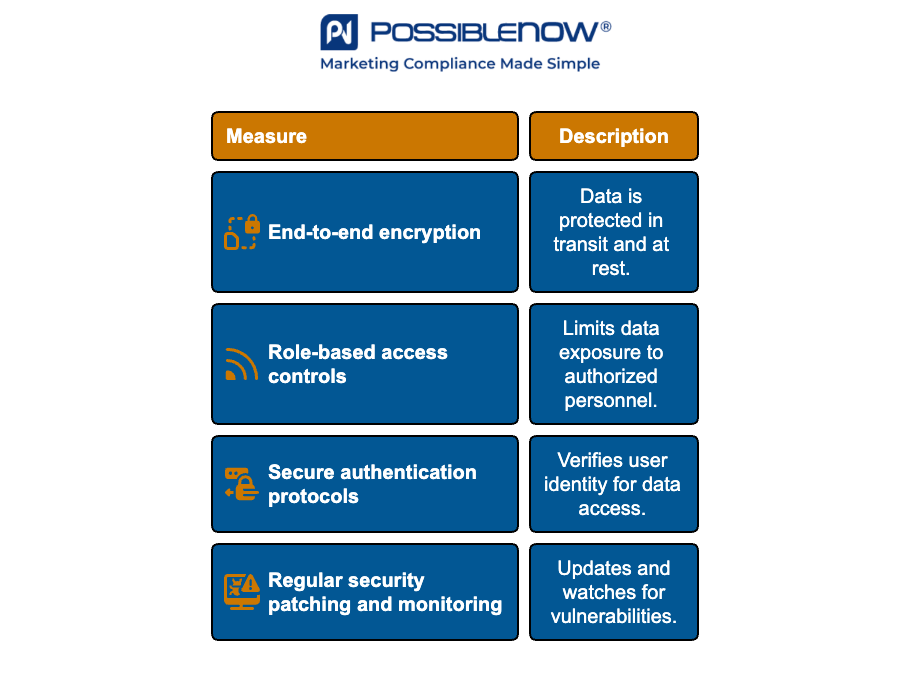Resource Center
How to Securely Store Do Not Contact Preferences
Type: Blog
Topic: Do Not Call Solution

Storing Do Not Contact (DNC) preferences securely is a compliance requirement under laws like the Telephone Consumer Protection Act (TCPA) and the FTC’s Telemarketing Sales Rule (TSR). Poor storage practices can expose your business to fines, data breaches, and damage to your brand.
To comply with DNC regulations, businesses must retain specific types of data, including:
- Customer opt-outs by channel (phone, text, email, etc.)
- Consent revocation timestamps and method of revocation
- Internal DNC list entries
- Subscription preferences and consent metadata, while not always legally required, are critical to proving compliance and honoring consumer choices.
- Records of contact suppression across systems
- Audit trails showing how DNC requests were processed
In the following sections, you’ll find information on:
Speak With an Expert Today
Here’s how to store this information securely and accurately across your enterprise.
Use Centralized, Permission-Based Systems
DNC data often touches multiple departments, platforms, and third-party tools. Without a centralized system, it’s easy to introduce inconsistencies that lead to non-compliance or poor customer experiences.
Centralized storage helps you manage suppression data in one place, apply rules consistently, and reduce the risk of outdated or overlooked preferences.
Choose platforms that offer permission-based access so only authorized personnel can view or modify contact records. Centralization not only improves accuracy but also simplifies audit preparation.
Protect Data with Enterprise-Grade Security Measures

DNC preferences contain personally identifiable information (PII), which makes them a potential target for misuse or breach. Your storage systems must include security controls such as:
- End-to-end encryption for data in transit and at rest
- Role-based access controls to limit exposure
- Secure authentication protocols
- Regular security patching and monitoring
Look for solutions that align with frameworks like SOC 2, ISO 27001, or GDPR security principles. These measures protect the integrity of your suppression records and reduce organizational risk.
Maintain Accurate, Real-Time Records
Timeliness is critical in DNC compliance. If a consumer opts out or revokes consent, your systems must update immediately to prevent further contact. Delays, even when they’re unintentional, can result in violations under laws like the TSR or TCPA.
Make sure your systems are integrated with your marketing, sales, and support platforms so updates to DNC preferences are reflected everywhere. Synchronization prevents gaps between what the consumer has requested and what your team executes.
Implement Clear Retention and Deletion Policies
Retention policies vary by regulation. For example, the Telemarketing Sales Rule requires businesses to honor internal Do Not Contact requests for five years. Other frameworks, like the California Privacy Rights Act (CPRA) and the EU’s GDPR, emphasize storing data only for as long as it is needed for its original purpose.
When data is no longer needed, delete or archive it securely using verifiable methods. Retaining data longer than necessary increases risk and may violate consumer rights.
Monitor and Audit DNC Compliance Regularly
Even with strong systems in place, gaps can emerge. Regular audits help confirm that your policies are being followed and that your suppression lists are current. Internal audits should review:
- Data access logs
- Suppression activity and list updates
- Third-party handling of DNC data
- Revocation and opt-out processing timelines
Audits also serve as evidence of compliance in the event of a regulatory inquiry or legal challenge.
How PossibleNOW Can Help You Secure DNC Data
PossibleNOW provides tools to help businesses manage DNC compliance securely and at scale:
- MyPreferences® allows you to manage consent and preference data across departments and systems. It centralizes consumer permissions in a single, enterprise-grade environment.
- DNCSolution® scrubs outbound contact lists against the National DNC Registry, state DNC lists and internal suppression lists, helping businesses stay compliant with real-time enforcement.
- TCPA compliance services support documentation, revocation handling, and audit trail maintenance, helping you meet both federal and state-level requirements.
By using these tools from PossibleNOW, organizations can securely manage DNC preferences while reducing risk and maintaining trust across every channel. Reach out today for a free demo.
Request a Demo Today
About PossibleNOW
PossibleNOW is the pioneer and leader in customer consent, preference, and regulatory compliance solutions. We leverage our MyPreferences technology, processes, and services to enable relevant, trusted, and compliant customer interactions. Our platform empowers the collection, centralization, and distribution of customer communication consent and preferences across the
enterprise. DNCSolution addresses Do Not Contact regulations such as TCPA, CAN-SPAM and CASL, allowing companies to adhere to DNC requirements, backed by our 100% compliance guarantee.
PossibleNOW’s strategic consultants take a holistic approach, leveraging years of experience when creating strategic roadmaps, planning technology deployments, and designing customer interfaces. PossibleNOW is purpose-built to help large, complex organizations improve customer experiences and loyalty while mitigating compliance risk.
-
TCPA Regulations and Compliance: Complete Guide
Type: Blog
Topic: Do Not Call Solution
-
Defining Meaningful Metrics: 6 Soft KPIs to Measure Customer Preference Collection
Type: Blog
Topic: Preference Mgmt
-
Email Preference Center Best Practices
Type: Blog
Topic: Preference Mgmt
-
The Basics of DNC Scrubbing: What Is a Do Not Call (DNC) Scrubber and Why Do You Need It?
Type: Blog
Topic: Do Not Call Solution
-
What is Consent Management, How it Works, & Why it’s Important for Data Compliance
Type: Blog
Topic: Consent Mgmt
-
Do Insurance Companies Cover TCPA Damages?
Type: Blog
Topic: Do Not Call Solution
-
8 Best Practices for Capturing GDPR Consent
Type: Webinars
-
Data Silos Cause Communication Gaps
Type: Videos
Topic: Preference Mgmt
-
Difference Between Preferences & Consent
Type: Videos
Topic: Preference Mgmt
-
Integrate Do Not Call Compliance with Preferences
Type: Videos
Topic: Preference Mgmt
-
Customer Preferences Require More Than One Flavor
Type: Videos
Topic: Preference Mgmt
-
Give Customers Opt-Down Options
Type: Videos
Topic: Preference Mgmt
-
Preference Center Organization
Type: Videos
Topic: Preference Mgmt
-
Strategic Consultants Benefited Scotiabank
Type: Videos
Topic: Industry Testimonials
-
Best Practices for Managing Do Not Email Lists
Type: Blog
Topic: Do Not Call Solution
-
How Do Not Call Rules Apply to Nonprofit Organizations
Type: Blog
Topic: Do Not Call Solution
-
How to Train Your Call Center on DNC Rules
Type: Blog
Topic: Do Not Call Solution
